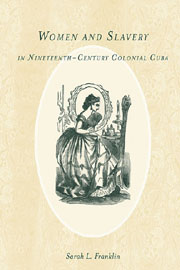Book contents
- Frontmatter
- Contents
- List of Illustrations
- Acknowledgments
- Introduction: Patriarchy, Paternalism, and the Development of the Slave Society
- 1 Virgins and Mothers
- 2 Wives
- 3 Pupils
- 4 The Needy
- 5 Wet Nurses
- Conclusion: A Shifting Landscape
- Abbreviations
- Notes
- Bibliography
- Index
- Rochester Studies in African History and the Diaspora
5 - Wet Nurses
Published online by Cambridge University Press: 05 February 2013
- Frontmatter
- Contents
- List of Illustrations
- Acknowledgments
- Introduction: Patriarchy, Paternalism, and the Development of the Slave Society
- 1 Virgins and Mothers
- 2 Wives
- 3 Pupils
- 4 The Needy
- 5 Wet Nurses
- Conclusion: A Shifting Landscape
- Abbreviations
- Notes
- Bibliography
- Index
- Rochester Studies in African History and the Diaspora
Summary
For Sale: One goat with two baby goats, excellent and very abundant milk.
For Sale: One conga women, with her baby aged 3 months, and with abundant milk.
—El Noticioso y Lucero de la Habana, December 1832, January 1833I have thus far sought to explore how Cubans employed patriarchy to implement and maintain the slave society of the nineteenth century. The method of doing so in large part involved discursive language and practice, espousing of social ideals, and exhortations about women's behavior to preserve order. Yet, those prescriptions for women could not be extended unilaterally to women of color. In many ways, their existence was oppositional. White women were virtuous and infused with honor, according to the prevalent discourse; black women were not. They were lustful, without honor, and their lot was to labor. However, motherhood itself appeared as both a central tenet of the system, and arguably, its greatest threat. White women and black women could all be mothers. Enslaved women might not be able to attain honor or virtue, at least in the eyes of whites, but they could and did give birth to their own children. Moreover, they often “mothered” the young white children of Cuba, as seen most clearly in their role as wet nurses. Consequently, historians are left to question how these two distinct oppositional positions can be reconciled under the umbrella of nineteenth-century Cuban patriarchy.
- Type
- Chapter
- Information
- Women and Slavery in Nineteenth-Century Colonial Cuba , pp. 125 - 146Publisher: Boydell & BrewerPrint publication year: 2012



